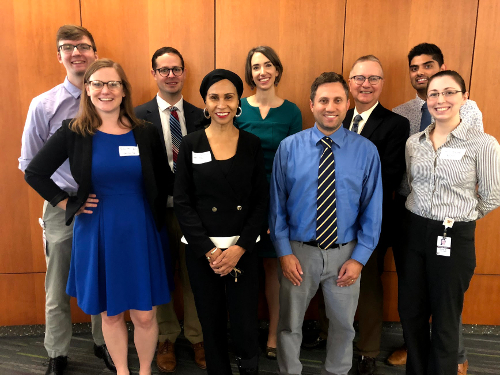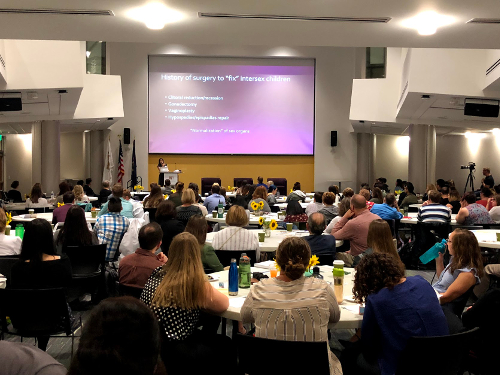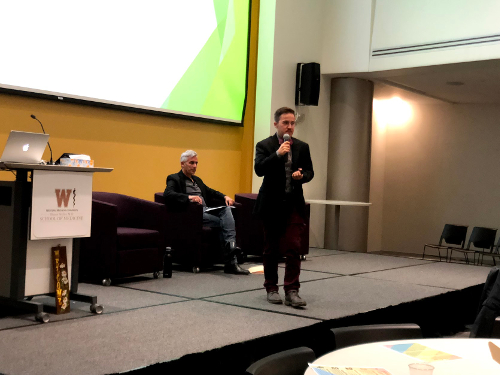
In the moments after the medical school’s first LGBTQ+ Health Equity Summit had concluded, Dr. Cheryl Dickson spoke about her hope that attendees walked away from the event with more knowledge, a deeper understanding and more compassion around the healthcare needs of the LGBTQ population.
“I hope they went away from this with more knowledge and, secondly, that they feel compassion and understand that this is important for them to know and that whatever they’re doing and wherever they are, they’re being inclusive and constantly learning more about what are the needs and what are the special needs of this population,” said Dr. Dickson, the medical school’s associate dean for Health Equity and Community Affairs.
More than 230 people attended the LGBTQ+ Health Equity Summit, which was held on Friday, September 21, at the W.E. Upjohn M.D. Campus.
The event featured several informative sessions, including “Justice, Equity and Solidarity: Ethical Duties in LGBTQ+ Health Care,” a presentation by Tyler Gibb, PhD, co-chief of WMed’s Program in Medical Ethics, Humanities and Law.
The other presentations were:
- “Caring for Transgender People Across the Lifespan” by Sara Wiener, LMSW, director of the Comprehensive Gender Services Program at the University of Michigan, Daniel Shumer, MD, a pediatric endocrinologist at U-M and John Randolph Jr., MD, an obstetrician and gynecologist and reproductive endocrinologist at U-M
- “Has Medicine Failed the Intersex Community? Regaining the Trust of Our Intersex Patients” by Ilene Wong, MD, a urologist, youth literature author and board member of interACT: Advocates for Intersex Youth
- “Lunch and Learn: Advocacy and Legal Issues for the LGBTQ+ Health Care” led by Jay Kaplan, staff attorney for the ACLU of Michigan and Jay Maddock, executive director of OutFront Kalamazoo.

For Dr. Dickson, the summit was the capstone of a one-year, $50,000 grant she received in 2017 from the Kalamazoo Community Foundation. The grant buoyed the launching of an initiative at WMed to address health disparities that exist in the transgender community through educational intervention for medical students, residents and community practitioners.
The work by Dr. Dickson has sought to develop a curriculum at the medical school for undergraduate and graduate medical education to provide training on treating transgender patients and embed awareness about transgender health care needs and disparities.
“I wanted to do a summit at the end, something that would bring together a health equity focus on LGBT, but particularly transgender health care issues so the event grew out of the grant,” Dr. Dickson said.
To make the summit a reality, Dr. Dickson worked closely with medical students from LAMBDA, a student interest group at WMed that works to raise awareness about issues concerning LGBTQ physicians, medical students and patients, as well as Drs. Kristine Gibson and Kristi VanDerKolk, assistant professors in the departments of Pediatric and Adolescent Medicine and the Family and Community Medicine, respectively.
She also acknowledged the hard work and dedicated support of Holly Ramsdell, WMed's director of Community Affairs and Dawn DeLuca, coordinator for Health Pathways, in organizing and planning, and making the summit a success.
M3 Josh Vandeburgh, the student leader of LAMBDA, said he and other organizers of the summit wanted to focus specifically on transgender issues because of the reality that transgender patients often avoid health care altogether because of fear of rejection or previous bad experiences with physicians.

“We’re really failing trans people in that way so this is a good way to get more information out there and start the process of changing that in the medical community,” Vandeburgh said. “I think more and more people realize that this is important and want to know more. Even if they don’t know what to do right now, they’re hungry for this information and that showed in the crowd.
“I think the speakers reiterated that no matter what you’re doing in medicine, you’re going to work with LGBTQ people, you’re going to work with trans people so knowing a certain amount of information and knowing how to work appropriately with this population is key,” Vandeburgh said. “Not knowing something is not an excuse to not serve this population. There are resources to look to provide to your patients and you can provide good care to these patients even if you aren’t an expert.”
Going forward, Dr. Dickson said she wants to build on the success of the LGBTQ+ Health Equity Summit by pursuing and holding quarterly sessions about LGBTQ+ issues for students, residents and faculty. She also wants to include session about LGBTQ+ health issues at the medical school’s Health Equity Summit, an event that was held most recently in June.
Such events, she said, will help to make members of the WMed community and others “culturally responsive and competent” in providing care to the LBGTQ population.
“You’re going to be seeing these patients and you need to be able to see them and treat them just like you would every other patient,” Dr. Dickson said.
